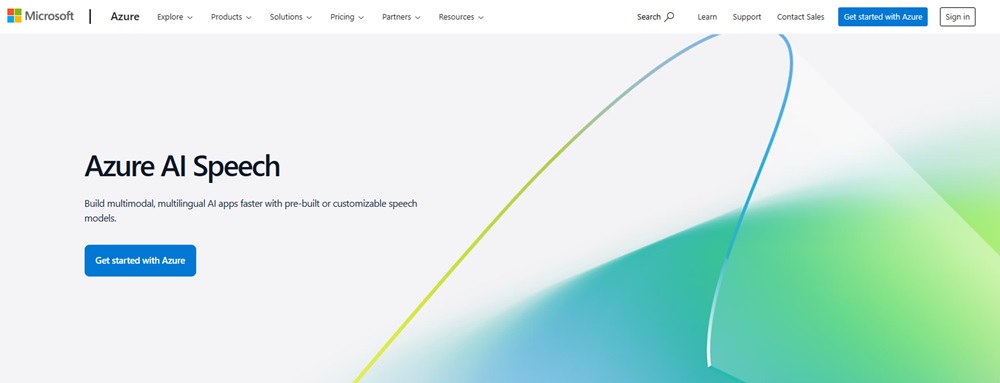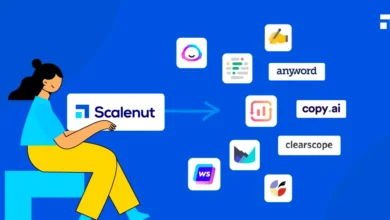Microsoft Azure: The Ultimate Guide & Reviews
Microsoft Azure Text to Speech Review: Pros, Cons & Pricing
Microsoft Azure Text to Speech uses sophisticated neural network models to translate text into speech that sounds natural. It’s perfect for developers and big businesses who require high-quality, scalable voice synthesis for voice assistants, content readers, and chatbots, among other applications.
But for individuals or small businesses, the expense can be prohibitive. Its extensive customization possibilities are useful for those with technical know-how, but others could find the setup difficult. If you require a strong, adaptable voice interaction solution, think about purchasing; if not, look into other affordable and user-friendly options.
The Azure Cognitive Services product “Custom Neural Voice,” which enables developers to create synthetic voices using neural text-to-speech technology, was made generally available by Microsoft today. Although it’s not widely accessible—customers need to apply and get approved by Microsoft—it is production-ready and accessible in the majority of Azure cloud regions.
The job of recording phone trees for eLearning scripts used in corporate training films frequently falls to brand voices, such as Progressive’s Flo. By reducing the need for additional recordings and pickups—recording sessions to fix errors, add, or modify voiceover scripts—synthetization has the potential to increase actors’ productivity. They could be able to pursue creative endeavors and earn residual income at the same time.
| 😂 Pros: | 😒 Cons: |
| Provides more than 500 standard AI voices and supports more than 140 languages and dialects. | Can be more costly than certain alternatives when used in large quantities. |
| Provides a wide range of customization choices for speech output using SSML. | Need some understanding to properly exploit integrations and advanced capabilities. |
| Profit from the dependable and scalable cloud infrastructure provided by Azure. | Depends on an internet connection in order to use cloud-based features. |
| Integrates easily with third-party tools and other Microsoft Azure services. | Inaccurate at times when it comes to word recognition and pronunciation. |
Microsoft Azure Text to Speech is a powerful service that enables developers and businesses to convert written text into natural-sounding speech. Leveraging advanced neural network technology, Azure’s TTS can produce high-quality audio in various languages and voice styles. This review aims to provide a thorough understanding of Azure Text to Speech, highlighting its advantages and disadvantages, along with pricing details.
Microsoft Azure Text to Speech is an effective tool for translating written text into natural sounding speech in a time when artificial intelligence is revolutionizing various industries. Voice synthesis is made possible by its sophisticated neural network technology, wide language support, and adjustable choices.
Azure Text to Speech helps improve your projects whether you’re making accessible instructional materials, improving customer interactions, or producing compelling content.
Do you want to learn more about Microsoft Azure text to speech ultimate guide and reviews? Here’s everything you need to know about this tool.
Are you looking to get Microsoft Azure? This cloud text-to-speech service, along with TTS, is just one of the numerous options available. Artificial intelligence, machine learning, deep learning, and other technologies enable the development of TTS programs such as Azure and Amazon Polly, among others.
What is Microsoft Azure’s text-to-speech?
Microsoft Azure is a cloud computing service created by a well-known firm. It provides SaaS, PaaS, and IaaS services and supports a wide range of programming languages, frameworks, and tools. Text-to-speech is one of the many functionalities available through Azure.
This means that TTS is just one of the many tools and features available within Azure. And the quality is amazing. This text-to-speech technology is extremely adaptable, with several applications in everyday life.
Key Features of Azure Text to Speech
- Natural-Sounding Voices: Azure TTS offers a variety of neural voice models that create highly realistic speech. The voices are designed to mimic human intonation, emotion, and pronunciation.
- Multiple Languages and Voices: Azure supports numerous languages and regional accents, making it one of the most versatile TTS services available. Users can choose from a wide selection of voice styles tailored for different applications.
- Customization Options: Users can fine-tune various aspects of the speech output, including pitch, speed, and pronunciation of specific words, allowing for greater control over the generated audio.
- SSML Support: Azure Text to Speech supports Speech Synthesis Markup Language (SSML) offering additional customization features like pauses, speaking rates, and emphasis that enable finer control over how the text is spoken.
- Integration with Azure Ecosystem: As part of Microsoft Azure, the Text to Speech service integrates seamlessly with other Azure services, enhancing functionality and providing a holistic solution for various applications.
- Real-Time Processing: Azure enables real-time conversion of text to speech, making it suitable for applications requiring instant voice responses such as chatbots and virtual assistants.
Unique Features:
The first thing to highlight is that Azure TTS has been totally upgraded to a neural engine. This is one of the key reasons why each voice sounds real. Azure also employs real-time synthesis, and you can leverage the platform’s API.
Azure also supports asynchronous voice production, which is ideal for lengthier files. If you want to convert a novel into an audiobook, this is the way to proceed. It is worth noting that this feature does not operate in real time. Finally, you can fine-tune voices with SSML.
Pricing:
| Plans | Free Tier | Pay-As-You-Go | Commitment Tiers (Monthly) |
|---|---|---|---|
| Neural Voices | 0.5 million characters/month | – | $960 for 80M characters $3,900 for 400M characters $15,000 for 2,000M characters |
| Standard Voices | N/A | $15 per 1 million characters | N/A |
| Custom Neural Voices | N/A | Professional Voice Synthesis: $24 per 1M characters | N/A |
| Custom Voice Training | N/A | $52 per compute hour Up to $4,992 per training | N/A |
| Endpoint Hosting | N/A | $4.04 per model per hour | N/A |
Merits of Microsoft Azure Text to Speech
- High-Quality Audio Output: The neural voices produced by Azure TTS are exceptionally realistic and engaging, making them ideal for creating professional-quality audio content.
- Wide Language Support: With support for multiple languages and dialects, Azure TTS is an excellent option for businesses looking to reach global audiences.
- Robust Customization Features: From voice selection to speech modulation, Azure TTS provides various options to tailor the audio output to user preferences and project requirements.
- Accessible Pricing: Compared to some competitors, Azure Text to Speech offers competitive pricing, allowing businesses to utilize high-quality TTS technology without breaking the bank.
- Strong Security and Compliance: With Microsoft’s reputation for security and compliance standards, users can trust that their data and content are handled safely.
Demerits of Microsoft Azure Text to Speech
- Learning Curve: While Azure TTS offers a rich feature set, it can be complex for newcomers. Users may require considerable time to understand and fully utilize all the functionalities.
- Variable Quality Across Languages: While many of the supported languages have excellent voice models, the quality may vary, with some less common languages lacking the same naturalness and richness.
- Network Dependence: Azure TTS is a cloud-based solution, meaning a steady internet connection is required. This can present limitations in situations where network connectivity is sporadic or unreliable.
- Token Limitations and Costs: Depending on the usage, costs can accumulate quickly, especially for applications requiring extensive text-to-speech conversions. Users need to monitor usage to stay within budget.
Pricing for Microsoft Azure Text to Speech
Microsoft Azure uses a pay-as-you-go pricing model, which can be appealing for organizations with fluctuating needs. As of July 2024, here’s an overview of the pricing structure for Azure Text to Speech:
- Neural Voice: Pricing is typically charged per character. For example, around $16.00 per million characters for the standard neural voice models.
- Standard Voice: Traditional neural voices may cost less than their neural counterparts, often around $4.00 per million characters.
- Customization: Custom voice solutions (for highly specific needs) generally incur additional charges, depending on the complexity and required resources.
- Free Tier: Azure offers a free tier that provides up to 5 million characters per month for neural voices, allowing users to experiment with the service without incurring costs.
Cost Management Tips
- Monitor Usage: Utilize Azure’s monitoring tools to keep track of character count and adjust your usage strategies as needed to control costs.
- Use the Free Tier Wisely: Take advantage of the free tier to test various features and determine how best to implement TTS in your projects without immediate investment.
Frequently Asked Questions
| 1. Is Azure Text to Speech safe? |
|---|
| Because Azure Text to Speech guarantees data security and complies with industry standards, it can be used in applications that handle sensitive data. |
| 2. Is Azure Text to Speech free? |
| Indeed, Azure has a free tier with use restrictions. Depending on your demands, you might need to look into the paid plans if you use them frequently. |
| 3. How do I start using Azure Text to Speech? |
| Installing the required tools, setting up a Cognitive Services resource, obtaining API keys, and creating an Azure account are the first steps. For a thorough guide, review the documentation for the Azure Speech service and enroll in classes. |
| 4. What customization options are available? |
| Adjusting pitch, pace, and pronunciation is only one of the many customization options available with Azure Text to Speech. Speech Synthesis Markup Language (SSML) gives you more sophisticated control over the output of your voice. |
| 5. What languages and voices are supported? |
| There are many different languages and dialects that Azure Text to Speech can handle. More expressive and authentic voices are added to the service’s voice selections on a regular basis. |
Conclusion
Microsoft Azure Text to Speech is a robust solution for businesses and developers seeking high-quality speech synthesis capabilities. With its range of natural-sounding voices, extensive language support, and customizable features, Azure TTS stands out as a preferred choice in the cloud-based TTS landscape.
While there are some drawbacks, such as a steeper learning curve and potential variability in output quality for specific languages, the overall benefits, including competitive pricing and strong security features, make Azure Text to Speech a solid option for various applications.
Organizations looking to harness the power of TTS for e-learning, customer engagement, entertainment, or accessibility should consider Microsoft Azure Text to Speech as a reliable and effective tool in their technology arsenal.
We have examined Microsoft Azure Text to Speech’s features, cost, advantages, and disadvantages in this evaluation. For companies and developers in need of strong, adaptable voice synthesis, we suggest it. FineVoice is a less complicated, more affordable option for individuals or small enterprises.
How do you feel? In the comments section below, please share your opinions and experiences with Azure and the TTS tools you use!
Alternatives
| Speechify | Murf AI | Natural Reader |
| Play.ht | Lovo | ElevenLabs |
| Synthesys | Listnr | WellSaid Labs |
| Microsoft Azure |






Can you be more specific about the content of your article? After reading it, I still have some doubts. Hope you can help me.